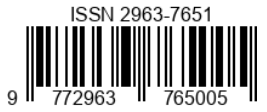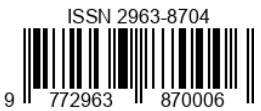The Investigation Process of Drug-Related Crimes Based on the Criminal Procedure Code (Kuhap) Within the Jurisdiction of the Salatiga Police Resort
DOI:
https://doi.org/10.55606/jhpis.v1i4.4691Keywords:
Criminal, Investigation, Narcotics, Offenses, ProcessAbstract
This study aims to understand the process of investigating drug-related criminal offenses based on the Indonesian Criminal Procedure Code (KUHAP) within the jurisdiction of the Salatiga Police Department. It also seeks to identify the obstacles faced in conducting the investigation of drug crimes based on KUHAP in the Salatiga Police jurisdiction and explore the solutions to these challenges. The research employs both normative juridical and sociological juridical methods, with a descriptive-analytical specification. The population and sampling method includes all objects, phenomena, events, or units that will be studied. Data collection techniques include library research and interviews, and data analysis is qualitative in nature. The steps in investigating drug-related crimes within the jurisdiction of the Salatiga Police Department are fundamentally similar to the investigation of other general criminal offenses, in accordance with KUHAP. The steps taken include: raids and arrests, searches, seizures, securing evidence, securing the crime scene, crime scene processing, evaluation, proof, and case development. Obstacles faced by law enforcement officers in investigating and resolving drug-related crimes in the Salatiga Police jurisdiction include: suspects failing to provide clear statements, witness testimonies that do not support the investigation, and incomplete evidence. Efforts to overcome these obstacles in drug crime investigations include: ensuring suspects provide clear and honest statements about the sequence of events and the drug crime objects involved, which can serve as evidence to uncover the crime; witnesses must cooperate with investigators by providing honest and complete testimonies to facilitate the investigation; investigators should work to find and gather at least two pieces of evidence in uncovering drug-related crimes; and fostering community involvement to assist in revealing drug crimes within the Salatiga Police jurisdiction.
Downloads
References
A. Zainal Abidin Farid. (2007). Hukum pidana I (Cetakan kedua). Sinar Grafika.
Adami Chazawi. (2002). Pelajaran hukum pidana bagian I. RajaGrafindo Persada.
Adami Chazawi. (2010). Pelajaran hukum pidana. PT. RajaGrafindo Persada.
Afidburhanuddin. (2013, May 21). Penelitian kualitatif dan kuantitatif. Afid Burhanuddin.
Ahmad Bahiej. (2009). Hukum pidana. Teras.
Andi Hamzah. (2008). Hukum acara pidana Indonesia. Sinar Grafik Offset.
Bambang Poernomo. (1992). Asas-asas hukum pidana. Ghalia Indonesia.
C.S.T. Kansil. (2002). Pokok-pokok pengetahuan hukum dagang. Penerbit Sinar Grafika.
Dafit Supriyanto Daris Warsito. (2018). Sistem pemidanaan terhadap pelaku tindak pidana penyalahgunaan narkotika. Jurnal Daulat Hukum, 1(1).
Donald Albert Rumoky, & Frans Maramis. (2014). Pengantar ilmu hukum. Raja Grafindo Persada.
Husaini Usman & Purnomo Setiady, Akbar. (2011). Metodologi penelitian sosial. Bumi Aksara.
Kitab Undang-Undang Hukum Acara Pidana (KUHAP).
Kitab Undang-Undang Hukum Pidana (KUHP).
Lamintang. (1990). Dasar-dasar hukum pidana Indonesia. Penerbit Sinar Baru.
Leden Marpaung. (2009). Proses penanganan perkara pidana. Sinar Grafika.
Martiman. (1996). Memahami dasar-dasar hukum pidana Indonesia I. PT Pradnya Paramita.
Moelyatno. (2008). Asas-asas hukum pidana (Cetakan kedelapan, Edisi revisi). Renika Cipta.
Moh. Taufik Makaro, Suhasril, & Moh. Zakky. (2003). Tindak pidana narkotika. Ghalia Indonesia.
Muladi. (2002). Lembaga pidana bersyarat. Penerbit Alumni.
Sapto Winengku, & Umar Mar'uf. (2017). Teknik pembelian terselubung dalam penyidikan tindak pidana narkotika. Jurnal Khaira Ummah, 12.
Sarjana Ekonomi. (n.d.). Purposive sampling. https://sarjanaekonomi.co.id/purposive-sampling/
Satjipto Raharjo. (2007). Membangun polisi sipil. Penerbit Buku Kompas.
Simons. (1992). Kitab pelajaran hukum pidana (Titel asli: Leerboek Van Het Nederlandse Strafrechtc). Diterjemahkan oleh P.A.F. Lamintang. Penerbit Pioner Jaya.
Soerjono Soekanto. Penelitian hukum. Universitas Indonesia Press.
Sri Endah Wahyuningsih, & Rismanto. (2015). Kebijakan penegakan hukum pidana terhadap penanggulangan money laundering dalam rangka pembaharuan hukum pidana di Indonesia. Jurnal Pembaharuan Hukum.
Sugiono. (n.d.). Adapun pengertian dan metode deskriptif-analistis menurut. Siti Farid.
Teguh Prasetyo. (2010). Hukum pidana. PT. Rajagrafindo Persada.
Undang-Undang No. 35 Tahun 2009 tentang narkotika.
Wahyu Sudrajat. (2017). Rekontruksi sebagai upaya mengungkap tindak pidana pembunuhan berencana (Studi Kasus Wilayah Hukum Polsek Banyumanik Semarang). Jurnal Hukum Fakultas Hukum Unissula.
Wikipedia. (n.d.). Hukum pidana. https://id.wikipedia.org/wiki/Hukum-Pidana
Yosy Budi Santoso, & Umar Mar'uf. (2017). Kebijakan pembuktian dan penuntutan oleh jaksa penuntut umum dalam pemberantasan tindak pidana korupsi. Jurnal Hukum Khaira Ummah, 12(2)
Yulies Tiena Masriani. (2004). Pengantar hukum Indonesia. Penerbit Sinar Grafika.
Downloads
Published
How to Cite
Issue
Section
License
Copyright (c) 2022 JURNAL HUKUM, POLITIK DAN ILMU SOSIAL

This work is licensed under a Creative Commons Attribution-ShareAlike 4.0 International License.








